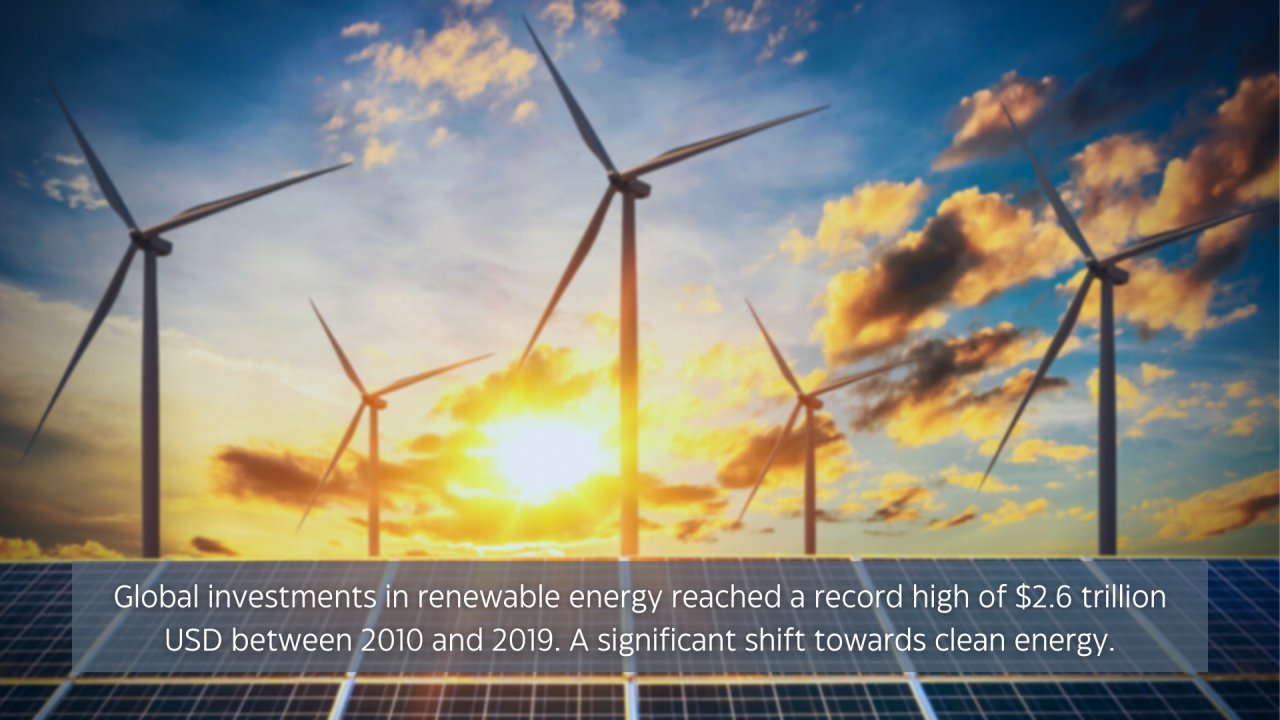Renewable Energy Investment: Overcoming Barriers and Creating a Supportive Framework with FloCard

Global vestments in renewable energy reached a record high
To limit the rise in temperature to well below 2°C, investment in renewable energy needs to increase by 150% between now and 2050.
The adoption of renewable energy technologies is essential to mitigate climate change and meet Sustainable Development Goal number 7 (SDG7) of affordable and clean energy. The good news is that the cost of utility-scale solar photovoltaic (PV) energy has decreased by over 60 % since 2010, and onshore wind energy by 20 percent. Despite the vast amount of capital available to finance #renewableenergy projects, the rate of investment in renewable energy is not progressing fast enough.
Renewable energy is not only critical for addressing climate change and achieving sustainable development goals, but it also presents an enormous economic opportunity. The transition to a low-carbon #economy could create millions of jobs and generate significant economic growth, particularly in emerging markets where there is often a high potential for renewable energy deployment
According to new research from the OECD, the main factors holding back investment and innovation in renewable energy in advanced and emerging countries include incoherent policies, misalignments in electricity markets, and cumbersome and risky investment conditions.
Policymakers and Investors Must Collaborate
We need to align incentives, take advantage of the complementary effects of different policies, and improve the investment environment in renewable energy, especially solar and wind energy. Policymakers need to focus on investment policy and facilitation, competition and trade policy, and financial access. However, there are still significant barriers related to policy and regulatory frameworks which can be complex, inconsistent, and uncertain. Investors need clarity and predictability in order to make informed decisions and manage risks regarding investment in renewable energy.
Financing Hurdles Despite Global Capital Availability
The financial sector encompasses more than €100 trillion of assets. So how is it that investment in renewable energy is not flowing faster? While there is no shortage of capital available globally, financing for renewable energy projects can be more difficult to obtain than financing for traditional energy projects. This is partly because renewable energy projects are often perceived as higher risk, and partly because of regulatory and institutional barriers that limit access to financing.
Unintended Consequences of Basel III Regulations Limiting Access to Financing
Finally, it is crucial to ensure that broader investment policies do not conflict with #lowcarbon investments. The implementation of Basel III banking regulations may have unintentionally limited access to debt financing for capital-intensive renewable projects.
Targeted Incentives Key to Boosting Renewable Energy Investment
To promote investment in deployed renewables and to address these challenges, policymakers need to design targeted incentives such as feed-in tariffs (i.e. a guaranteed minimum price per unit of renewable power generated), renewable energy certificates (a certificate proving that one unit of electricity was generated from a renewables source, which can be sold separately from the underlying physical electricity associated with a renewable-based generation source), and public tenders (which include public competitive bidding or auctions for a set capacity of renewable power).
Feed-in tariffs and certificates, in particular, have driven investment in advanced countries, and auctions and tenders have supported renewables investment in emerging markets. Explicit carbon prices, achieved through carbon taxes or emissions trading schemes, have driven investment in renewables in the European Union and in emerging economies, and across OECD and G20 countries in solar energy.
OECD analysis shows that, historically, increasing the capacity of a tender by 1 MW leads to a 0.1 per cent increase in renewables investment flows.
Promote Low-Carbon Investment
It also requires improvements in the investment hashtag#environment, including investment policy and facilitation, competition and trade policy, and financial access. And, critically, it requires alignment between climate policies and broader investment policies to ensure that low-carbon investment is not at odds with other investment objectives.
OECD Calls for Evidence-based Policies and Stakeholder Cooperation
To achieve the Paris Agreement’s goals and #SDG7, we need to increase investment in renewable energy and other low-carbon technologies on a much larger scale. Evidence-based research and stakeholder cooperation are critical in designing effective public policies that facilitate the transition to a low-carbon economy. The OECD is committed to supporting these goals through the OECD Centre on Green Finance and Investment.
Overall, the transition to a low-carbon economy presents significant challenges, but also enormous opportunities. By creating a supportive policy and regulatory framework and improving access to financing, policymakers can help unlock the full potential of renewable energy and drive sustainable economic growth.
FloCard: The Platform Driving Collaborative Climate Action
FloCard is a powerful tool that can facilitate partnerships and collaborations between businesses, societies, communities, and individuals to drive the necessary transformation to achieve the goals set out in the #ParisAgreement. We can help organizations and individuals work together to address climate change by providing a platform for communication, collaboration, and resource sharing. By leveraging the collective knowledge, skills, and resources of different stakeholders, FloCard can help drive innovative solutions that are critical to reducing greenhouse gas emissions and building a more sustainable future.
One of the key benefits of FloCard is that it can help build partnerships at different levels, from global partnerships between businesses to local partnerships between community groups and individuals. By working together, these partnerships can share best practices, #collaborate on projects, and advocate for policy changes that can help accelerate the transition to a low-carbon economy.
How FloCard can foster partnerships for businesses?
For businesses, FloCard can help drive sustainability initiatives, including reducing greenhouse gas emissions, improving energy efficiency, and promoting the use of renewable energy sources. By partnering with other businesses, governments, and communities, companies can gain access to new ideas, technologies, and resources that can help them achieve their sustainability goals more quickly and effectively.
FloCard can empower communities to drive grassroot sustainability initiatives
At the hashtag#community level, FloCard can help drive grassroots initiatives that promote sustainability and resilience, such as community gardens, renewable energy projects, and local food systems. By working together, communities can leverage their collective knowledge and resources to create meaningful change and build a more sustainable future for all.
In all, FloCard is an innovative tool that can help drive partnerships and collaborations across different sectors and levels to address climate change and achieve the goals set out in the Paris Agreement. By working together, businesses, societies, communities, and individuals can create a more sustainable future for all.
Click on FloCard to explore more.
